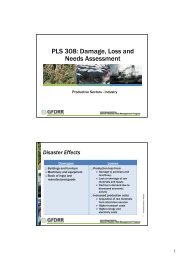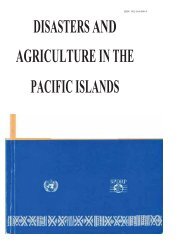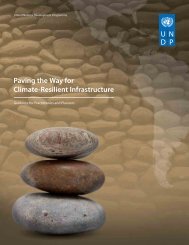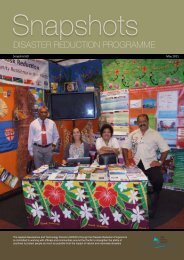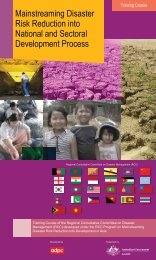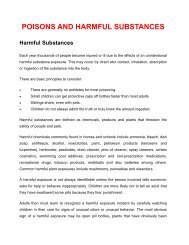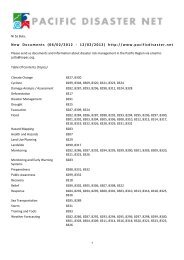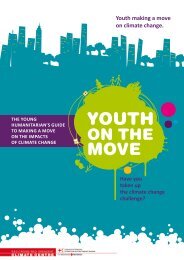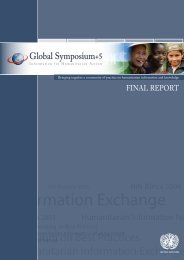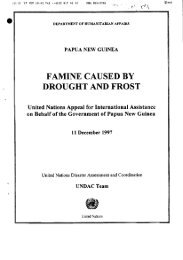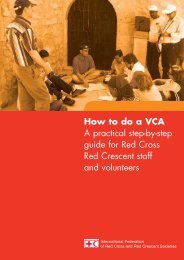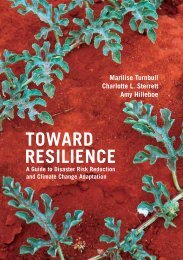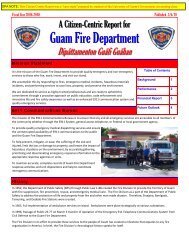A global review of disaster reduction initiatives - Welcome to the ...
A global review of disaster reduction initiatives - Welcome to the ...
A global review of disaster reduction initiatives - Welcome to the ...
You also want an ePaper? Increase the reach of your titles
YUMPU automatically turns print PDFs into web optimized ePapers that Google loves.
4Living with Risk: A <strong>global</strong> <strong>review</strong> <strong>of</strong> <strong>disaster</strong> <strong>reduction</strong> <strong>initiatives</strong>Future challenges and prioritieschallengesThe wide range <strong>of</strong> selected information servicesand program <strong>initiatives</strong> described above providea basis <strong>to</strong> identify primary areas for futureimprovements in information management and<strong>the</strong> communication <strong>of</strong> experience in <strong>disaster</strong>risk <strong>reduction</strong>. Five key areas are identified:• Availability <strong>of</strong> information• Necessary capacities <strong>to</strong> utilize data• Clearing house responsibilities• Expanded access <strong>to</strong> information• Future technologyAvailability <strong>of</strong> informationThere is currently abundant information,available <strong>global</strong>ly, on <strong>disaster</strong> risk <strong>reduction</strong>but that does not necessarily translate in<strong>to</strong> itswidespread availability, nor is it particularlywell targeted for all potential users. In manyplaces and cultures <strong>the</strong>re is little relevant informationconveyed that is suited <strong>to</strong> local languagesor <strong>the</strong> actual living conditions <strong>of</strong> peopleexposed <strong>to</strong> natural hazards.The very abundance <strong>of</strong> information also createsa problem for non-specialized or publicusers <strong>to</strong> ascertain <strong>the</strong> relative value or quality <strong>of</strong>specific information, if <strong>the</strong>y are unaware <strong>of</strong> <strong>the</strong>originating source or broader pr<strong>of</strong>essional context<strong>of</strong> <strong>the</strong> various sources.Useful information demands that databases bekept current, bibliographic resources be continuallyexpanded, and that access and searchcriteria should remain consistent and be widelyunders<strong>to</strong>od by an expanding user group.Necessary capacities <strong>to</strong> utilize dataFrequent observations are made by individualcountry authorities about <strong>the</strong> inadequacy <strong>of</strong>many institutions that frustrate <strong>the</strong>ir desire <strong>to</strong>know exactly what relevant information exists,where <strong>to</strong> find it, and how <strong>to</strong> access it in <strong>the</strong>most efficient manner.A priority initiative <strong>of</strong> considerable benefitwould be <strong>the</strong> joint conduct <strong>of</strong> a national auditabout risk-related information needs, availabilityand limitations. International organizationscould help by providing guidance about existingsources or means for obtaining well-suitedinformation.The engagement <strong>of</strong> existing regionallyfocussedinformation centres such as CRED,CARDIN, ADPC, ADRC, and <strong>the</strong> University<strong>of</strong> Colorado’s Natural Hazard Center, and<strong>the</strong> use <strong>of</strong> <strong>the</strong>ir experience in linking suppliers<strong>of</strong> information with practitioners would be particularlyvaluable.Clearing house responsibilitiesThere is a glaring need for an internationalcapacity <strong>to</strong> fulfil clearing house functionsspecifically related <strong>to</strong> <strong>the</strong> identification, orderingand dissemination <strong>of</strong> hazards and <strong>disaster</strong>risk-management information. The intendedrole is one that could foster <strong>the</strong> exchange <strong>of</strong> relevantinformation through <strong>the</strong> use <strong>of</strong> lists <strong>of</strong>lists, direc<strong>to</strong>ries, and catalogue/search/retrieve/deliver procedures that would serve <strong>to</strong>direct and connect a very wide range <strong>of</strong> usersand practitioners for all policy-making levels.Such facilities exist but concentrate on international<strong>disaster</strong> response or <strong>disaster</strong> preparedness,such as ReliefWeb and GDIN.The ISDR secretariat is working in associationwith partners, and is in <strong>the</strong> process <strong>of</strong> streng<strong>the</strong>ningits web site and resource centre <strong>to</strong> builda comprehensive and easily accessible series <strong>of</strong>direc<strong>to</strong>ries and linkages that can form <strong>the</strong> basis<strong>of</strong> an approach <strong>to</strong> such a <strong>global</strong> clearing housefunction for <strong>disaster</strong> <strong>reduction</strong>.By pursuing <strong>the</strong> issue <strong>global</strong>ly, <strong>the</strong> existence <strong>of</strong>primary information gaps, <strong>the</strong> inadequacy <strong>of</strong>relevant data, or geographical shortfalls ininformation availability or dissemination maybe more easily identified and addressed. Such acoordinated approach can also, with adequate176



